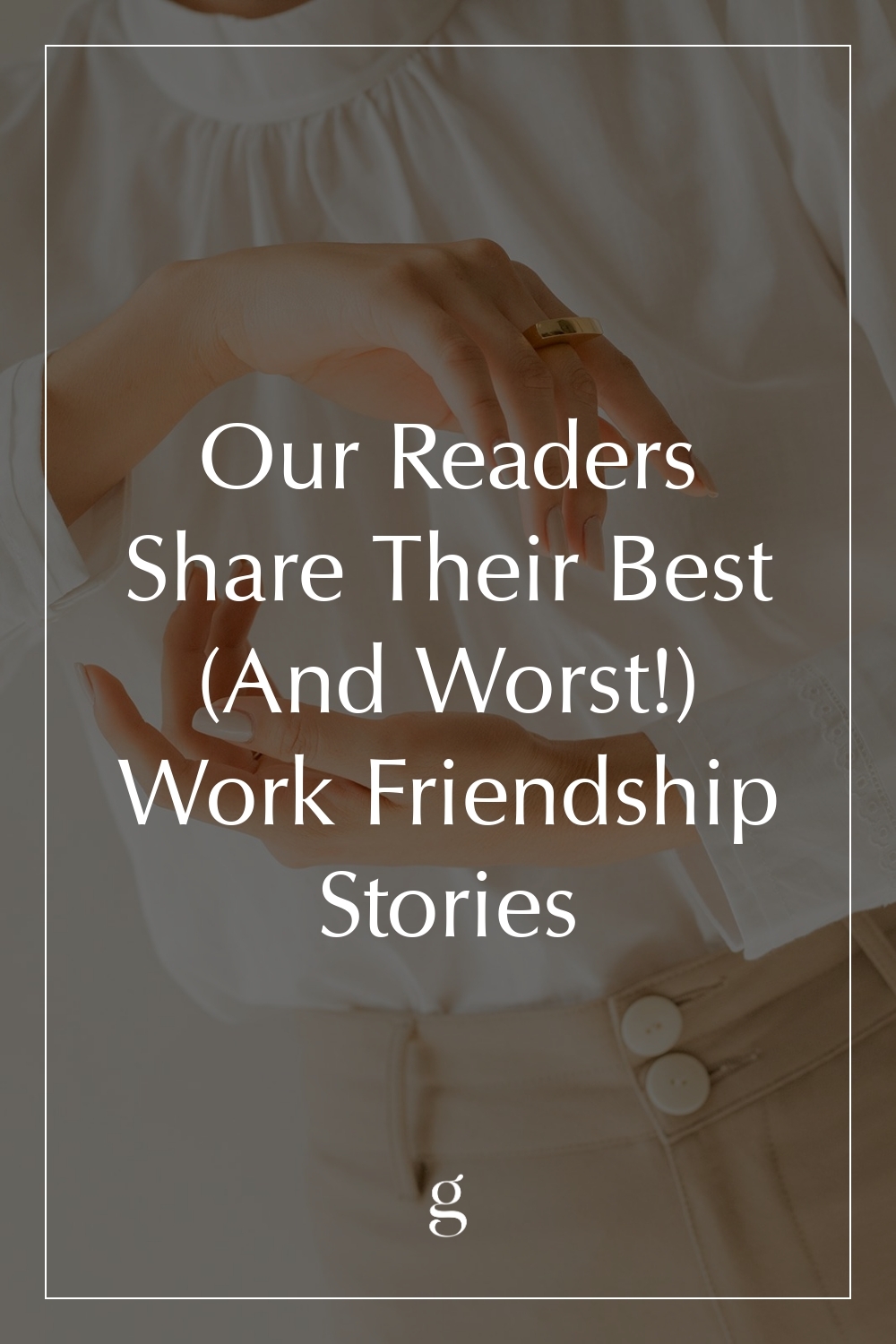
Our Readers Share Their Best (And Worst!) Work Friendship Stories
“The people you work with are just, when you get down to it, your very best friends.” – Michael Scott, The Office
Friendships in the workplace. They can be a doozy. Work and play don’t always mix and, as some of you have shared with us, fostering healthy, professional relationships with coworkers is far from easy. The good news is, these kinds of relationships are possible. Sometimes they simply require a little extra effort and love (and a handful of honest conversations about boundaries at the office).
But don’t take our word for it. We asked you all to share your very best (and worst) stories about relationships in the workplace. We were thrilled to learn some of you have found life-long friendships. We were equally impressed by the way some of you have navigated conflict, even ending toxic relationships when necessary.
Dental Assistant, 23
Illinois
“I used to think I wouldn’t get more than a paycheck out of this career, but I’ve found a lifelong friendship.”
“Although I pride myself on being friends with my coworkers, there’s one particular friendship that stands out most. Deb (name changed for privacy) is twice my age, which has given our friendship a not-so-typical dynamic. The differences in our lives are humorous, as the things I struggle with as a newlywed are similar to things Deb struggled with before I was even born. It’s comforting to know that we all share the same frustrations, even with decades between us.
I know I can confide in Deb and tell her my secrets—work-related or otherwise, and she can do the same. She provides valuable insight into simple tasks and helps me think through overwhelming decisions, like whether or not I should pursue a degree to benefit my future career. I value this friendship even more so because my dad’s best friend was also over twice his age, and my dad eulogized his funeral. I used to think I wouldn’t get more than a paycheck out of this career, but I’ve found a lifelong friendship.”
Sales Account Manager, 25
Dallas, Texas
“I met one of my best friends at work. We bonded when our offices were next to each other. She was dating a guy and, one day, a different guy sent her flowers for Valentine’s Day—but it wasn’t the guy she was dating. We bonded over this experience as we discussed who she should spend time with for V-Day. We ended up deciding that she should go on a Valentine’s Day date with the guy who sent her flowers because the guy she was dating was kind of a dud and hadn’t even made Valentine’s plan with her yet. They’ve now been married for a year and I was a bridesmaid at their wedding!”
Graphic Designer, 29
Phoenixville, Pennsylvania
“[My] friend at work became the family I unexpectedly missed. He encouraged me to come out of my shell, inspired me to grow professionally, and was always by my side through the hard times.”
“I formed a friendship with a coworker while working at Starbucks during college; my school was in the town I grew up in. It was after a divorce, and my family had suddenly moved away, leaving me feeling as if I’d been the one to move away for college. The friend at work became the family I unexpectedly missed. He encouraged me to come out of my shell, inspired me to grow professionally, and was always by my side through the hard times.
Now, a decade later, his life has taken him down a difficult road. We’re unable to see each other in person, but through letters, I’ve become his home away from home during the hardest time of his life. I only hope that the little stories we tell each other will help him be strong and keep our friendship alive.”
Teacher, 25
Memphis, Tennessee
“I’m my most powerful self at work because I get to work with my best friends every day.”
“My friends at work get me through the day and the YEAR (and the hour!). Teaching is a really rough profession and hardly anyone understands what we do. So having close friends who work in the same field is nice, but particularly nice when they work in the same building. It can be really helpful to have people who see the same messed up power dynamics, who experience the same day-to-day struggles, who can cover your class when you need to run to the restroom, who can love your students as they move up to the next grade level, who can hold you accountable for being your best self, and who can let you cry on the toughest days.
My closest coworkers know my enneagram number and I know theirs, so we call each other out when we are being ridiculous, counsel each other through tough moments, and love each other at our weakest AND strongest. One of my coworkers recently told me, ‘I’m my most powerful self at work because I get to work with my best friends every day.’”
Project Assistant, 26
Chicago, Illinois
“I am shy about my birthday, and my sweet coworker realized before the day was over that I hadn’t mentioned it at all and was appalled (in the kindest way). Near the end of the workday, she turned from her desk in our open-office workspace and shouted: “IT’S YOUR BIRTHDAY! YOU WERE GOING TO LET US ALL GO HOME WITHOUT CELEBRATING?!” She then rallied our coworkers and they treated me to a post-work treat. It meant a lot to me that she not only remembered my birthday but made a point to celebrate me because she knows I am not the type to really do that for myself.”
Police Officer, 25
Sydney, Australia
“Keeping these friends close means I can trust them, and I can divulge my experiences without their judgment.”
“I have two friends that I keep close, and I make an effort to maintain those relationships outside of work. Particularly in law enforcement, with the things we see and deal with, it is so important to be able to talk about our feelings, emotions, and experiences. Sometimes, telling my boyfriend or family about these things can be pretty traumatic for them, and I don’t want to see them get upset when they don’t have to be.
Keeping these two friends close means I can trust them, and I can divulge my experiences without their judgment. I know that if I ever needed help with my mental health, they will support me no matter what, and I would do the same for them.”
Market Researcher & Entrepreneur, 49
Toronto, Canada
“I have tried make friends at work—everyone needs to feel connected to someone, and having positive relationships at work can help with looking forward to your day. But because I was a manager, it seemed my coworkers expected special treatment. If I approached them about corrections or mistakes, they would get extremely upset. It was hard. No matter how carefully I tried to address issues, they didn’t take it well. I don’t attempt to make friends at work any longer. It brings in an emotional component that many people find difficult to manage.”
Health & Safety Specialist, 33
Vancouver, Canada
“Not every job is going to have a “best friend” for me. You do your best to connect with people and fill the rest of your cup after work.”
“I recently started a new job (nine months ago). In every other job, it was so easy for me to make friends—some of my closest friends have come from previous jobs. So coming here and not feeling a connection to someone right away was really hard for me. I didn’t feel like there was anyone I could be myself with. It took months of building relationships, proving my worth at the company, and continuing to be myself. I can say I definitely have work friends now, and people I can be myself with. I had to realize that not every job is going to have a “best friend” for me. You do your best to connect with people and fill the rest of your cup after work.”
Marketing Coordinator, 24
Boston, Massachusetts
“It’s nice to develop a close friendship with a coworker that evolves outside of the office, but sometimes it can turn toxic. I’ve had a good friendship experience when the coworker and I had a very limited working relationship. She was in a different department on a different team that I rarely engaged with. This coworker, in particular, ended up quitting a few months ago but we’ve made sure to hang out every few weeks; as a young adult, I really appreciate the new friend as I find they’re hard to come by.
In another circumstance, I found that sometimes you form friendships at work due to age similarities even though you have little else in common. I have a work friend that I have so little in common with that sharing lunches has become excruciating, and I resent setting that expectation in the first place. I also found that when it comes down to assigning responsibilities for a project, my coworker in an adjacent department did not respect my authority and routinely questioned my judgment in the process. We had a slight falling out when I told her I was exhausted by a recurring problem she constantly brought up, and have barely spoken since. It’s a weird situation because we know so much about each other, but now don’t speak.”
Teen Leadership Director, 28
Seattle, Washington
“Just like with every relationship: take your time, look for red flags, learn to trust, and enjoy!”
“It’s important to have friends at work. We spend most of our time in that space, so if you don’t have some people to share it with, it can make for a difficult workday. During my last job transition, I thought it would be smart to keep the people I worked with at an arm’s length. But I soon learned that my coworkers and I needed to communicate with each other. We needed to be able to talk about job performance, how to ask for a raise, the next steps in our career, and more. To talk about those topics, we had to establish trust and rapport.
The women I work with are now my friends. We feel like we have teammates on tough days, and we’ve grown close as friends outside of work, too. Friends at work can be a great thing. Just like with every relationship: take your time, look for red flags, learn to trust, and enjoy!”
Program Manager, 33
Colorado
“I asked a friend at work to be in my wedding, and it seemed like such a great idea at the time because I spend 40 hours a week with this person and “I know them so well.” In the end, I had to ask her not to be in my wedding. You think you know someone at work, but then you start doing things together outside of work and blending with your other friends. You realize that you might not know the 40-hour-a-work-week-friend as much as you thought. It was a challenging conversation to discuss that being in the wedding wasn’t right for our friendship at the time.
After it was all over, we became closer because we had gone through this sort-of weird tip toe-dance: awkward feelings and then having to see each other every day at work, and then exploding and talking about all the weird feelings. It was still, to this day, one of the most mature situations I have been through with a friend, even compared to those with my very best friends. It was good for me to connect in that manner with a coworker and come out on the other side with a really important friendship.”
Digital Marketer, 23
Manchester, UK
“It’s important to have friends who are older because they can give you a perspective on your own life that can really help you through tough times.”
“When I moved up to Manchester from Brighton, I felt the loss of a mother figure quite heavily. I’ve never been a mummy’s girl, but I trust my mother with giving me the best advice and being there in the worst of moments. When I started working in this new office, there weren’t many of us, but one woman [we’ll call her Sharon] made me feel instantly comfortable.
Though Sharon didn’t remind me of my mum, she had a sensibility around her that allowed me to open up and talk about the things I would usually only discuss with my mum. She’s really helped in moments when I feel lost, and she listens if I want to talk about a horrible period. She even compliments me when I’ve had a haircut. I’d never expected to get along with someone of her age—she’s older than me and has children—however, her presence has been so key to my happiness in this new place. I would definitely say it’s important to have friends who are older because they can give you a perspective on your own life that can really help you through tough times.”
Account Manager, 24
Leicester, United Kingdom
“I had a close friend that I made at work. She was my support system and everything was going great—we were both on different teams so our dynamic worked well. On a particular project, we were put together; that’s when it went downhill. We both clashed in our working styles. I would stay behind to help her, and for her to not acknowledge my support really hurt me. The final straw was when I had an anxiety attack at work and she put the project above me and walked away. It’s always messy mixing friendships and work, even if you’re on different teams.”
Tech Sales, 27
New Zealand
“When you work 40 hours a week (minimum), you need to have a great support crew—whether that is one person or a whole group.”
“I am very lucky to work with an incredible group of women—believe me when I say this is very rare in the male-dominant IT industry. We’ve created friendships that surpass the nine-to-five workday. We go away for long weekends without our husbands, have spa nights, and go to concerts. When you work 40 hours a week (minimum), you need to have a great support crew—whether that is one person or a whole group. I feel proud to work alongside such strong, fun, and talented ladies.”
Human Resources, 34
Australia
“Two of my bridesmaids are former colleagues. I worked alongside one of them at a part-time retail job during university. The other was my replacement when I moved into a new role! I am very careful with my role as a manager. I’m friendly, but not their close friend. That’s important for whenever we need to have a tough conversation about work. But, they can confide in me if they need some extra support. So far it’s been working well.”
RELATED READING
Kayti Christian (she/her) is an Editor at The Good Trade. Growing up beneath the evergreens in the Sierra Nevadas, she returns to California after a decade split between states—including three years lived abroad. With an MA in Nonfiction Writing, she’s passionate about storytelling and fantastic content, especially as it relates to mental health, feminism, and sexuality. When not in-studio, she’s camping, reading memoir, or advocating for the Oxford comma.


